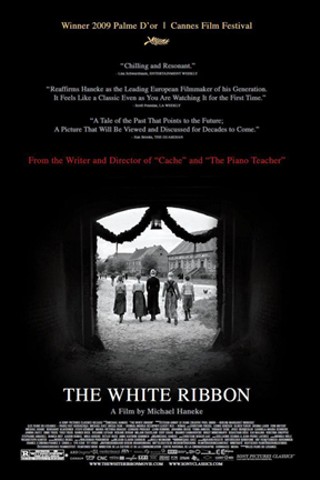It's a common—but difficult to pull off—trick of literature to have a superficial story riding on top of a subtle set of background clues that provide a more satisfying and richer explanation for everything that occurs, if only the audience can put the pieces together. You see it in Nabokov's Pale Fire, Melville's Moby Dick, and Morrison and Quitely's All Star Superman. In short, it's a central feature of many great works of art.
And it's the central conceit behind The White Ribbon. The film follows the recollections of a schoolteacher (played by Christian Friedel as a young man, and Ernst Jacobi in voiceover narration) who looks back some 50 years to a time just before World War I, when he worked in the small German village of Eichwald. The story starts when the town's doctor (Rainer Bock) is coming home from a ride on his horse. Suddenly, the horse trips over a wire that has clearly been left to cause injury to the doctor. It's a strange case of sabotage, made stranger when the wire vanishes, and the town's schoolchildren gather in a silent vigil.
A few weeks later, a woman falls through the floor of a poorly maintained factory. Shortly thereafter, the son of the baron who owns the factory is taken out and beaten by unseen assailants. Finally, some months after that, a retarded boy, the child of a single woman (Susanne Lothar) who assists the doctor, is brutally assaulted and left in the forest. These events seem connected, but no obvious motive can tie them together. It's as though some terrible evil is visiting the town, leaving no clue to its source.
Unless you watch the film closely. It's actually littered with clues, and the seemingly senseless becomes both comprehensible and especially horrible, considering the country these children will grow up to inherit.
Filmmaker Michael Haneke is best known to American audiences for movies that are technically precise, intellectually challenging and utterly revolting. He's the mind behind Funny Games—easily the most unpleasant, and one of the most brilliant, works of cinema I've ever seen—and The Piano Teacher, which featured a 50-year-old woman trying to rape her 80-year-old mother. But, like the crowd at CPAC, only some of his work involves over-the-top explorations of violence and geriatric incest.
The White Ribbon is, instead, an extremely understated movie. Sure, there's violence, and ugly people having oral sex, and some incest, but most of it occurs off-camera, and most of the film is quiet and still. Much of it is shot in natural light, or with only in-scene lighting, creating a look reminiscent of Sven Nykvist's work with Ingmar Bergman in the '60s.
There's nothing warm or nostalgic about the cinematography by Christian Berger, though it is starkly beautiful. And the acting is weirdly stiff, which seems fitting for this uptight, overly Christian town that lives in fear of the whims of the land-owning baron and the vicissitudes of an unpleasant God.
So it's sort of worth seeing—in fact, a lot of people are raving about it. But I found it a bit too cold, and while it was fun to string together the puzzle pieces, I can't say that The White Ribbon was terribly entertaining. Nonetheless, it offers some charms for those more interested in intellectual art than affective force.
One of the things that make this film interesting is the role of the three patriarchs in the village. They never encounter each other, and their stories don't seem to intersect until you catch the clues, which is a nice trick. But what ties them together is that, as the film progresses, the seemingly decent doctor and kindly baron turn out to be vile narcissists, whereas the stern and unlikable minister (Burghart Klaussner) is shown to be sad, soulful and sympathetic.
It's the minister's habit of teaching his children Christian dogma that leads to the terrors that infest the town. The strangest of the crimes is the murder of the minister's beloved pet bird, and it's the only crime during which the perpetrator is made plain. It's also the moment when all of the clues begin to coalesce.
But the strangest event is the final beating of the midwife's mentally retarded son. Only if you put together the midwife's relation to the doctor, and the biblical quote left on the boy, and the admonitory sermons that the minister gives does it make any sense. And even then, it's a horrible kind of sense, motivated by the sort of thing that moves people to put strange symbols on their arms and herd people like pigs into slaughterhouses.
Haneke always seems to succeed in his filmmaking goals, and all of his movies can be appreciated as examples of conceptual art. However, they're not always fun to sit through. The original Funny Games (I can't speak about his American remake) is a perfectly executed assault on audiences. His Caché explores a kind of day-to-day boredom in a way that replicates what it looks at. And The White Ribbon observes the slowness of village life with a concomitant cinematic slowness. It's an interesting idea, and each moment seems perfectly picked to produce the effect Haneke is after—but I'm not sure it's an effect most moviegoers would enjoy.











